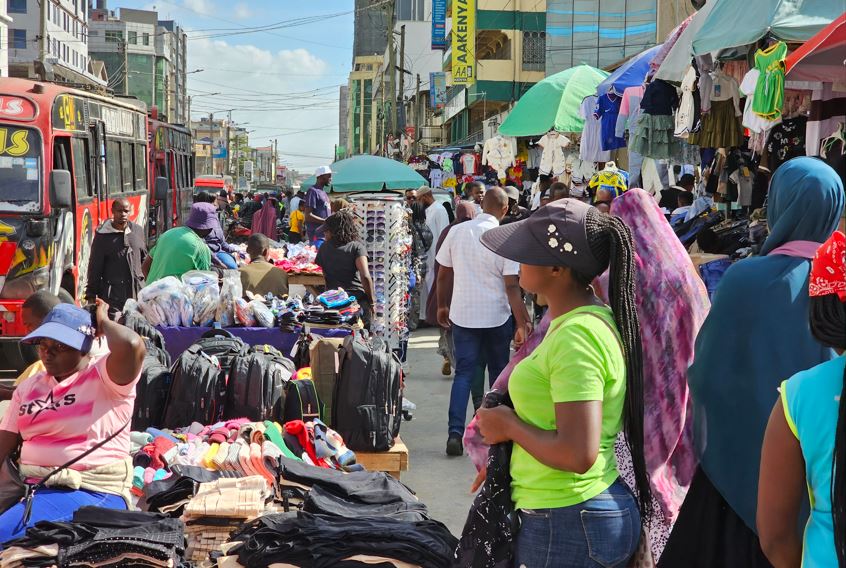Influx of hawkers in Eastleigh sparks concerns

Officially, hawkers in Eastleigh are allowed to conduct business starting at 5 p.m., as the mornings are reserved for shop owners and mall businesses.
Eastleigh is facing challenges due to an increase in hawkers who have moved into the area.
These hawkers, previously believed to be operating in Nairobi's Central Business District (CBD), were evicted by Governor Johnson Sakaja's administration.
More To Read
- How Nairobi’s women hawkers risk it all to make ends meet
- Eastleigh traders accuse City Hall of inaction as unlicensed hawkers flood streets despite ban
- Nairobi book vendors decry City Hall's backstreet relocation directive
- Eastleigh hawkers suffer losses as heavy rains halt trade for third straight day
- Eastleigh Business owners demand action against hawkers, taxi operators
- Traffic chaos in Nairobi CBD resolved after meeting between matatu operators, hawkers
Streets such as Moi Avenue, Haile Selassie Avenue, Kenneth Matiba Road, Latema Road, Ronald Ngala Street, Mangano Street, Hakati Road, and River Road were cleared of hawkers as part of the city's efforts to address congestion.
A number of the displaced hawkers have now migrated to Eastleigh, where they are operating during unauthorised hours.
Officially, hawkers in Eastleigh are allowed to conduct business starting at 5 p.m., as the mornings are reserved for shop owners and mall businesses. However, sources told Eastleigh Voice that corrupt city askaris, commonly known as Kanjos, are permitting hawkers to operate during the day in exchange for weekly bribes.
The Eastleigh Business District Association (EBDA) Chief Executive Officer, Mohamed Adan, has expressed concern over the situation. He stated that allowing hawkers to operate during the day is not only illegal but also poses safety risks.
He emphasised that Yusuf Haji Avenue and General Wariungi Street should remain free from hawkers at all times, as these roads are designated for emergencies.
 Hawers selling second hand clothes are puctured along Yusuf Haji Avenue in Eastleigh on Wednesday afternoon, January 15, 2025. (Photo: Abdirahman Khalif)
Hawers selling second hand clothes are puctured along Yusuf Haji Avenue in Eastleigh on Wednesday afternoon, January 15, 2025. (Photo: Abdirahman Khalif)
"This is risky. Imagine if a vehicle loses its brakes. There could be many casualties. We want these roads to remain clear," said Mohamed.
Kanjos criticised
He also criticised the Kanjos for directing hawkers to operate on the roads instead of the pavements, further increasing the danger.
Mohamed called for strict enforcement of regulations requiring hawkers to use back streets and only operate from 5 p.m. He noted that while hawkers benefit corrupt officials, business owners in shops and malls contribute to both national and county revenues through taxes.
"It is unacceptable. Hawkers benefit Kanjos illegally, but mall owners and shop operators support the economy through taxation," he added.
Hawkers, however, argue that they have limited options. One hawker, speaking anonymously, told The Eastleigh Voice that they are trying to provide for their families.
"Everyone here has families to support. Where do you want us to go? The back streets they want us to use have no customers. We are here because this is where the buyers are," he said.
Hawkers in Eastleigh have also been accused of contributing to the area's garbage problem. Reports indicate that many hawkers fail to clean up their workspaces at the end of the day. Some pay street families to dispose of their waste, but these families often dump the garbage on the roads, worsening the situation.
When Governor Sakaja visited Eastleigh in June last year, he described the area as the economic heartbeat of Nairobi, generating over 35% of the city's annual revenue.
Business leaders now fear that unregulated hawking could harm Eastleigh's reputation and disrupt its economic contributions.
Top Stories Today












































